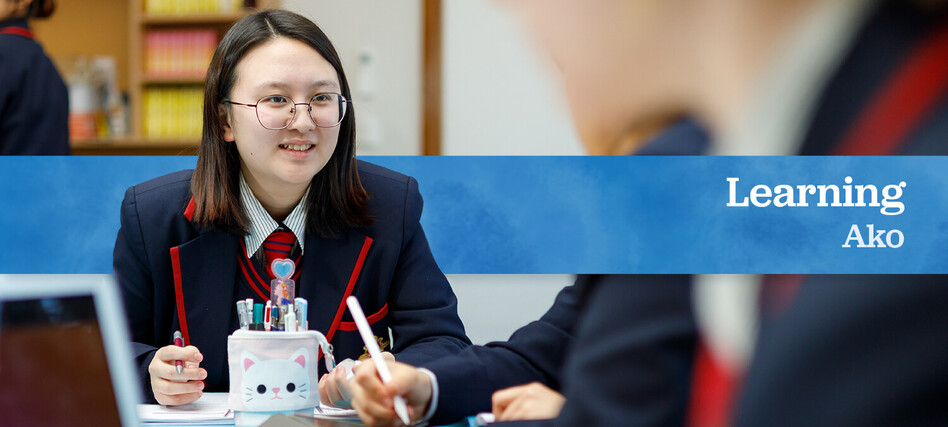Curriculum and teaching that engages
Waikato Diocesan School's range of subjects and challenging educational experiences are designed to meet and extend the needs of students. At Dio, we see school as a place to seek and build knowledge, explore new ideas, and work to achieve the highest possible standards.
Dio students perform admirably compared to national averages and across all year levels. While such national bench-marking is important, our primary goal is to challenge each student to achieve at their highest level.
Field trips, visiting speakers, national and international competitions, access to technology and e-learning, and excellent teaching resources all enhance the learning experiences of our students. Every opportunity is taken to give students real-world experiences and hands-on tasks as part of their learning.
Staff expect all students to extend themselves to reach their full potential, in an environment of healthy challenges.
At each level, students are mentored through course selection, goal setting, learning needs, time management, and study skills.
All students follow a Religious Studies and Physical Education and Health programme as these elements are at the core of educating the whole student at Waikato Diocesan School for Girls.
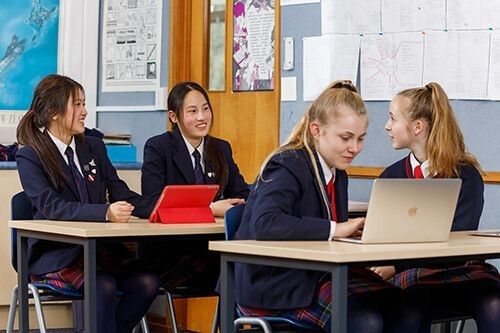
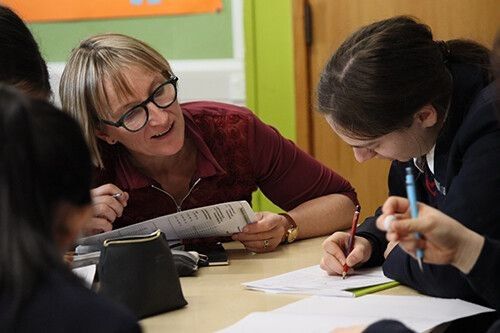
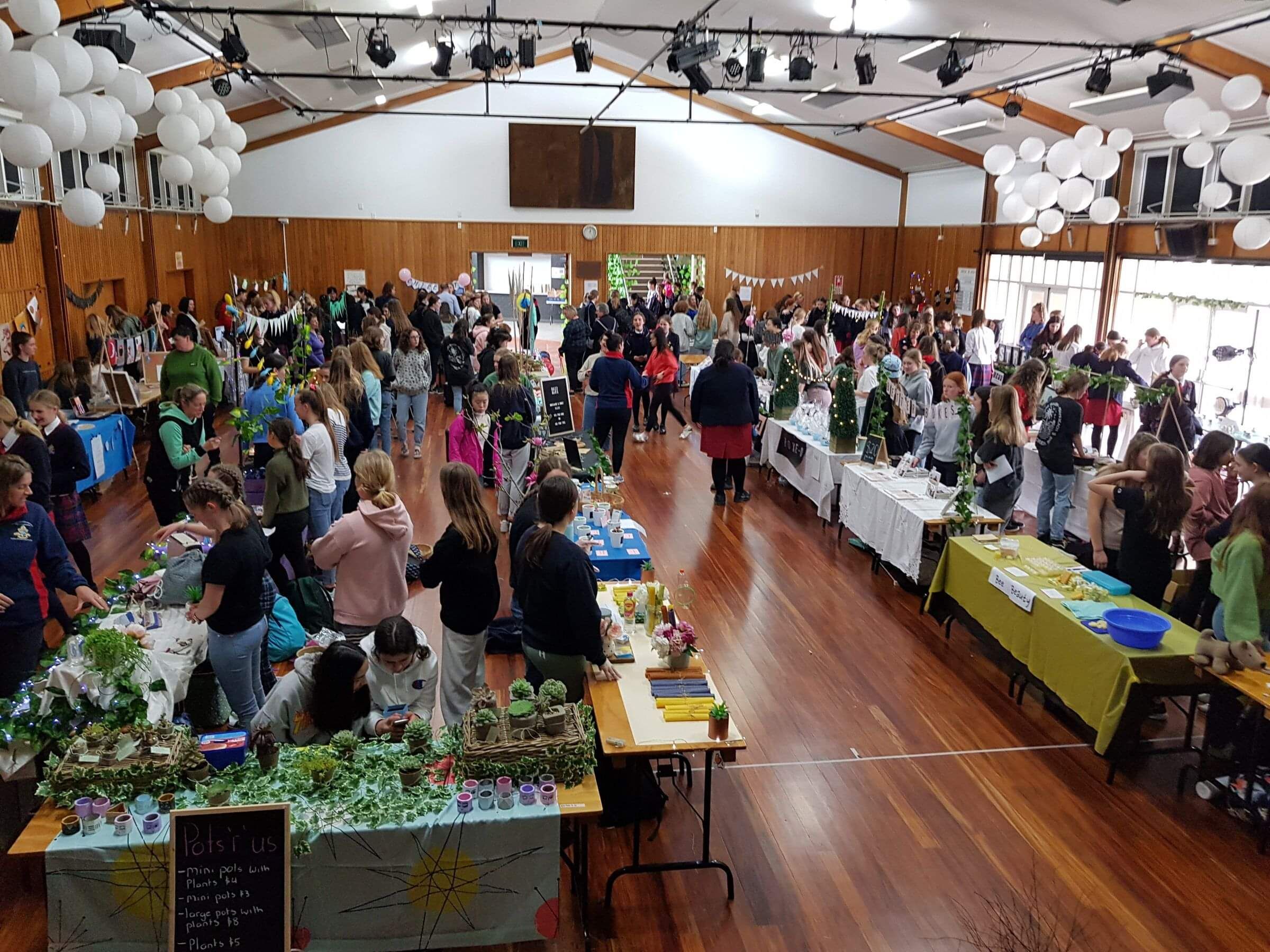
Junior Programme
Each student is placed in a class that best suits their learning needs. This class placement is based on the placement test results, information from contributing schools and any required information. All classes are challenging, and students are expected to maximise their learning opportunities at Dio. Year 9 students find out which class they are in at the start of the school year, and a letter will be emailed to parents/caregivers by the last week of January to confirm your aakonga's learning programme.
The mission of the Junior Programme of Learning at Waikato Diocesan School for Girls:
To provide a programme in which each student is given a broad and sound foundation in order to develop her personal and interpersonal skills, and to assist her in building meaningful relationships with God, with self, with others, with society and with the environment.
The Junior Programme of Learning will also provide each student with an appropriate level of challenge and support so that she can develop the necessary skills and learning strategies to equip her for the academic rigour of senior school.
The curriculum at Year 9 is designed to give students a sound foundation of content and skills and to enable them to make informed subject selections as they move through to senior school.
All students study the following subjects during the year:
Year-long Courses
English
Mathematics
Physical Education & Health
Religious Education
Science
Social Studies
Year 9 students study one language for the entire year unless they are on an individualised learning programme. Students choose from one of the following:
Year-long Language Courses
French
Te Reo Maaori
Students who require extra literacy support will do so instead of studying a language. This will be at the discretion of the HoD Learning Support and in consultation with parents/caregivers.
PLEASE NOTE: While every effort will be made to give students their first language selection, this cannot be guaranteed due to timetabling constraints and the viability of running courses for small class numbers. However, we will endeavour to cater for everyone’s preferred choices.
All students also study four of the following subjects as foundation modules during the year, including at least one arts subject and one technology subject:
Arts
Art
Dance
Drama
Music
Technology
Design and Visual Communication (DVC)
STEAM Studio
Fashion and Design
Food Technology
PLEASE NOTE: While every effort will be made to give students their first four choices, this cannot be guaranteed. Please be assured that none of these foundation modules are prerequisites for taking the subject the following year. Even if a student does not study a subject as a foundation module in Year 9, they can still enrol in that subject as a Year 10 student.
Year 10 Curriculum
In many ways, Year 10 is very important in a student's education. The skills gained, opportunities taken, and experiences enjoyed will lay a foundation for academic, physical, cultural, creative, and spiritual success throughout a student's schooling. In Year 10, a student:
Continues their spiritual journey in keeping with the Anglican character of the school.
Develops a global conscience through participating in school-sponsored service programmes and interacting with various faiths, cultures, and international experiences.
Makes subject choices that provide some specialisation and preparation for NCEA.
Takes a wide range of subjects that keep options open
Builds on essential knowledge and understanding in the different learning areas
Consolidates effective learning and study habits
Experience assessments designed to demonstrate achievement and inform further learning needs, with emphasis on self-evaluation and goal-setting
Extends themselves in particular areas of talent or interest across the curriculum and beyond the classrooms
Sets goals about the future based on talents, interests, and passion
Has individual learning needs met within the short or long-term
Has a special focus on thinking ethically and responsibly about technology, society, and personal health
Takes responsibility for self in all areas of school life
Challenges their personal, physical, and spiritual strength.
Gets involved in school life through House events, chapel and assembly, sports, arts, and cultural groups; takes opportunities to participate and lead
Has a voice in school governance through the Student Council and links with student leaders and teachers.
Develops skills enabling them to make healthy life choices
Senior Programme
Waikato Diocesan School offers a holistic education and seeks to nurture every facet of every student. The values, academic and life skills, and love of learning students acquire at Waikato Diocesan School will lay the foundation for a meaningful and successful life beyond school. Our NCEA results and sporting and cultural achievements show that our students respond positively to opportunities and challenges.
Students are taught in accordance with the internationally acclaimed New Zealand Curriculum. An increasingly wide range of courses is available to give a broad general education while also providing a foundation for future specialisation. Within individual courses, we emphasise the importance of learning, developing independence as a learner, making cross-curricular connections, solving problems, or undertaking projects in real-life contexts.
We provide a positive and focused learning environment to help students meet their individual learning needs. Students can also expect to be involved in various co-curricular and extracurricular activities, which will enhance learning and help develop the personal and social aptitudes that will enable valuable contributions to the community.
A diverse range of subjects and a committed and well-qualified staff prepare students well for tertiary education and other vocational pathways. NCEA provides great flexibility in course choice, requiring careful planning. Informed subject and course choice are important, and teachers, deans, and the careers advisor provide students with clear guidance for planning a course of study relevant to future career pathways.
The Senior Options Guide assists students and their parents in deciding on subject choices for their senior school years. It is to be used in conjunction with curriculum planning sessions and, where necessary, individual interviews with the deans, careers advisor, subject teachers, or senior leadership.
NCEA
The National Certificate of Educational Achievement (NCEA) is the primary national qualification for New Zealand secondary school students. NCEA is recognised by employers and used for selection by universities and polytechnics in New Zealand and overseas.
Each year, students study several courses or subjects.
In each subject, skills and knowledge are assessed against several standards. For example, a Mathematics standard could be: Apply numeric reasoning in solving problems.
Schools use a range of internal and external assessments to measure how well students meet these standards.
When a student achieves a standard, they gain several credits. Students must achieve a certain number of credits to gain an NCEA certificate.
There are three levels of NCEA certificate, depending on the difficulty of the standards achieved. Students generally work through levels 2 and 3 in years 12 and 13 at school.
Students are recognised for high achievement at each level by gaining NCEA with Merit or NCEA with Excellence. High achievement in a course is also recognised.
NCEA Results
The Dio Difference is in the results
We can take enormous pride in our NCEA and scholarship results as a community. Our students continue to achieve some outstanding overall achievement and endorsement rates.
Of particular note is that our pass rates exceed those at each year level across New Zealand, according to decile 8 to 10 schools and ethnicity. All our students achieved their academic potential with our Maaori and Pasifika students' NCEA achievement equal to or greater than our non-Maaori and Pasifika students.
There is much cause for celebration, and we are very proud of our senior students and the teachers and staff who support them to such impressive levels of academic achievement.
Scholarship
Scholarship is a monetary award to recognise top secondary school students. Scholarship exams are externally assessed and are an additional set of exams. They do not attract credits, nor contribute towards a qualification, but the fact that a student has gained a Scholarship appears on their Record of Achievement.
For more information, click here.
Advanced Learning Support
The learning needs of gifted and talented students are accounted for in personalised advanced learning programmes, and elite senior academic students are invited to join the Scholars mentoring programme, which aims to enable maximum academic achievement and provide guidance for future thought–provoking seminars which allow students to think outside the box.
Advanced learning support is holistic to support gifted and talented students’ development within their area(s) of capability, whilst concurrently supporting their social and emotional well-being and growth. There is a focus on fostering resilience within these students so they can make choices that lead them to live fulfilled, meaningful and satisfying lives.
The Individual Education Programme is the foundation for ensuring students have educational opportunities that allow talents to flourish. We meet regularly with students to discuss their needs and to implement strategies to ensure those needs are being met. These strategies could include:
Extension work in class
Curriculum compacting, allowing for in-depth inquiry
Individual subject acceleration to a higher year level
Utilising Te Kura - The Correspondence School
University papers
We also provide enriching co-curricular experiences. These could include field trips, workshops, and speakers. Alongside the academic support, students receive regular mentoring from the Head of Advanced Learning.
Learning Support
Our Learning Support Team, whose role is to meet the remedial learning needs, especially in literacy and numeracy, supports the learning extension needs of individual students. The role of learning support is to provide a needs-based learning support structure so that all students can reach their true potential. This is achieved through:
Provision of appropriate resources
Modified programmes/assessments / IEPs
Small group and individual support
In-class support/withdrawal support
Priority is given to students identified through assessment as having significant learning needs. This information is obtained from school-based assessments, contributing school information, educational psychology reports, and community and caregiver information. Support is offered across the curriculum and all year levels.
Secondary Tertiary Alignment Resource (STAR)
The STAR is funding provided to all state Secondary Schools to help students decide what they want to do when they leave school. This gives students access to a wide range of courses that will motivate them to achieve and help to make informed decisions about their future.
There are many opportunities available to Dio students, ranging from one-day short courses to university papers. One-day courses are beneficial to students who may be unsure of their career path whereas university papers are designed to challenge Year 13 students academically in preparation for future learning.
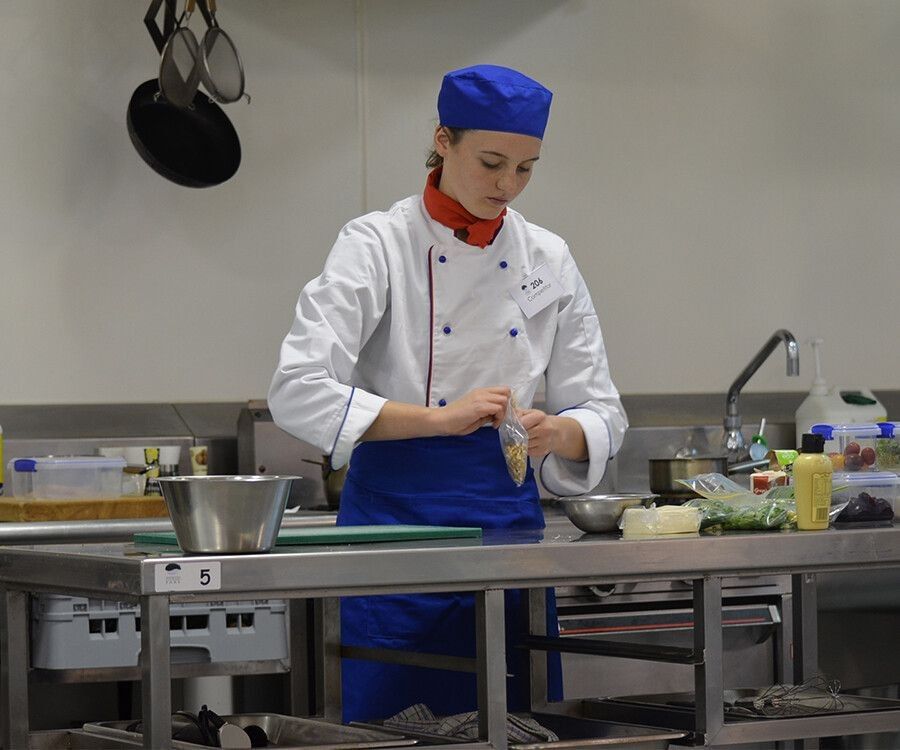
Library
The Dio library holds a range of items, including books, DVDs, and magazines. We also subscribe to the Wheelers ePlatform, with a large selection of ebooks and audiobooks. These can be accessed through the library database below.
The library is open 8:00 am - 4:30 pm Monday to Thursday and 8:00 am - 3:30 pm on Fridays.
Online Database
Click here to access the library database
Sign in, and you will be able to keep up-to-date with anything happening in the library, view and reserve items, access EPIC databases, and use one search.
Senior Dux Recipients
- 1922: T. Monckton
- 1923: N. Sergel
- 1924: N. Sergel
- 1929: M. Taylor
- 1930: E. Bell
- 1934: A. Every
- 1937: N. Pirritt
- 1938: B. Graham
- 1939: B. Calvert
- 1940: A. Anderson
- 1941: B. Graham
- 1942: P. Tod
- 1943: B. Potts
- 1944: H. Paine
- 1945: M. Corbett
- 1946: J. Beattie
- 1947: J. Beattie
- 1948: S. Fletcher
- 1949: A. Reid
- 1950: G. Wilson
- 1951: G. Wilson
- 1952: H. Pearson
- 1953: P. Davis
- 1954: R. Clifton-Mogg
- 1955: A. Stephenson
- 1856: B. Johnson
- 1957: J. Wallis
- 1958: J. Gardner
- 1959: C. Petch
- 1960: D. Rogers
and S. Roberts - 1961: A. Cato
- 1962: A. Ellis
- 1963: M. Allman-Marchant
- 1964: B. Lewis
- 1965: J. Bambury
- 1966: I. Ollivier
- 1967: I. Ollivier
- 1969: A. Hodgson (Science),
M Waring (Arts) - 1970: F. St George
- 1971: A. James
- 1972: J. Sampson
- 1973: M. Wood
- 1974: S. Stephenson (Arts),
K. Lipscombe (Science) - 1975: S. Gumner
- 1976: P. Jolly
- 1977: K. Lamb
- 1978: R. Holmes
- 1979: L. Sadler
- 1980: M. Rothwell
- 1981: B. Higgins
- 1982: F. Katterns
- 1983: R. Blake
- 1984: J. Bindon
- 1985: H. Priest
- 1986: S. Nicholson
and P. Thornton - 1987: T. Stanford
- 1988: S. Scott
- 1989: J. Gould
- 1990: C. Lowe
- 1991: K. Bannon
1992: I. Ng
1993: P. Bond
and J. Tay1994: P. Bull
1995: R. Walters
1996: S. Healy
1997: J. Hill
1998: K. Bartlett
and A. McConnell1999: D. Koo
2000: A. Yeh
2001: J. Matthews
2002: R. Bright
and C. Davey2003: S. Lee
2004: A. Young
2005: K. Lin
2006: R. McMaster
2007: E. Dale
2008: E. Wheeler
2009: N. Harrington
2010: T. Sun
2011: J. Ratcliffe
2012: M. Barker
2013: E. Totman
2014: E. Tsen
2015: A. Newell
2016: A. Spittal
2017: C. Lin
2018: E. Williams
2019: T. Mayo
2020: A.Thotathil
2021: S. Kilgour
2022: M. Jeng
2023: S. Hilton
